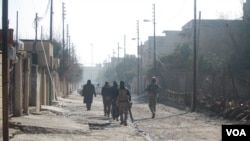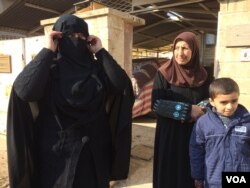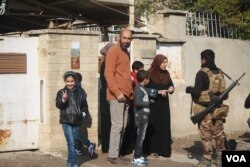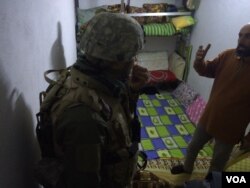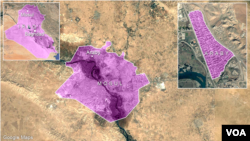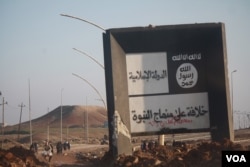"When Islamic State authorities were around, we wore it like this," says Dalia, a mother of two, demonstrating how to make her black face veil cover even her eyes, two days after Iraqi forces took back her neighborhood.
"When they were not around, your eyes could show," she adds. "But the eyebrows had to stay covered."
Dalia whips off the veil and offers it to me as a memento. With only one neighborhood in eastern Mosul still held by IS militants, she is confident she won't need it again.
Overhead, soldiers in a helicopter fire a machine gun into the next neighborhood. A walkie-talkie crackles a message: The fire killed two or three militants approaching Iraqi lines.
Six-year-old Aya, Dalia's daughter, smiles and flashes a victory sign, seeming not to notice the sounds of bullet fire and airstrikes. "We are used to it," she says.
Her uncle Aymad shows us a room in their basement where the family slept for more than a week as Iraqi forces approached their neighborhood, finally capturing Araby in less than two days over the weekend.
"We were really scared by the car," Aya admits, referring to a car bomb Friday morning that sent shrapnel and burnt up car parts soaring over their garden wall from a block away.
A few minutes later, though, she poses again with her fingers in a "V" for victory as her family speaks to soldiers, telling them everything they know about IS militants that may help them in their fight.
Other locals appear just as confident, coming out of their houses to greet Iraqi soldiers as they search abandoned homes for weapons and bombs. Many of the men still wear their hair in IS style, including long beards.
"Why haven't you shaved yet?" asks one passing soldier.
"We don't have any electricity," a man shouts back, laughing.
The soldier waves, but later says Dalia's confidence is not shared by all.
"They aren't shaving because they are still afraid," he says quietly. "They think IS could come back."
Fleeing and returning
A few kilometers away, out of range of the ongoing battle, families stream in and out of the warzone on foot. Civilian cars are banned in recently captured areas of Mosul because Iraqi forces don't want to confuse families with car bombers.
Unused vehicles are parked across streets, blockading neighborhoods from possible bombers.
"My four-year-old daughter wants a banana," says Mohammad, a mechanical engineer and a father of two, as he walks. His family had been holed up in their home for two months in Araby while bombs rained down in nearby neighborhoods. With the army in charge, he says, he's just out to get supplies.
Other families are returning to Araby, because they were forced to retreat with Islamic State militants. After both their neighborhood and the area they moved to were captured by Iraqi and coalition forces, they are making their way home.
But most families on the move here are fleeing IS, ongoing fighting, or shortages of water, food and electricity that plague nearly all of recent Iraqi-controlled Mosul.
"We've been walking for two days," says Qasair, a former cashier in a shopping mall. "The militants told us we had 10 minutes to get out, or they would kill us all. Ten minutes."
The militants thought Qasair’s family was sharing information with the Iraqi army and forced them to flee their homes with nothing. Like some of the men in Araby, he still wears a long beard and IS-style pants.
"I don't care about my beard and trousers," he says. "But killing and torturing people?"
Qasair pulls out an identification card and holds it in the air, close to tears. "My brother was a captain in the army and they killed him a year ago," he says.
I ask if he and his family were, in fact, sharing information with the Iraqi army, as IS had accused them.
"Of course," he replies.




